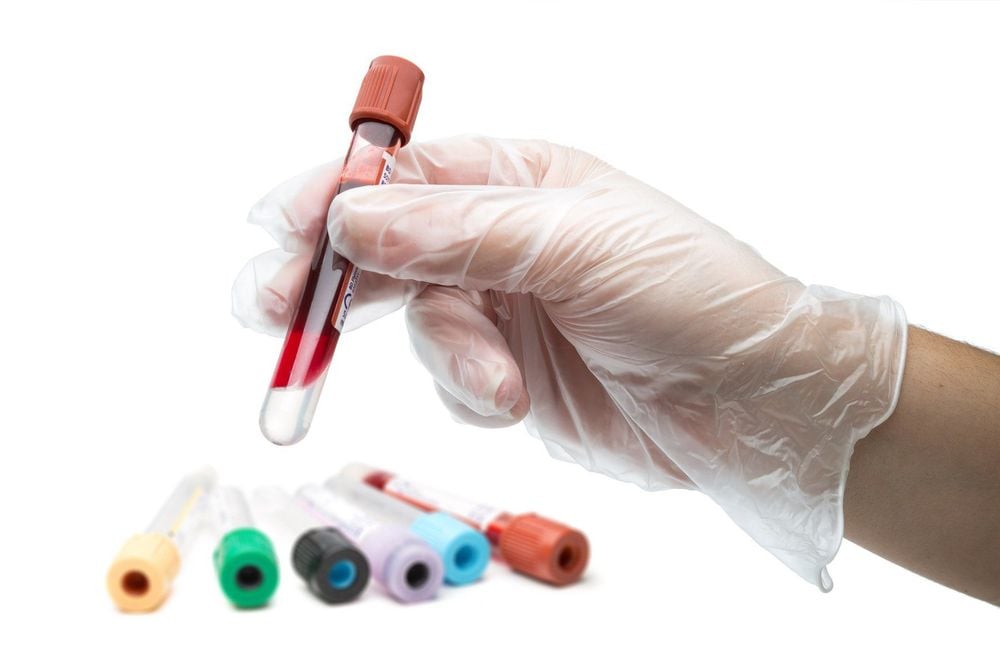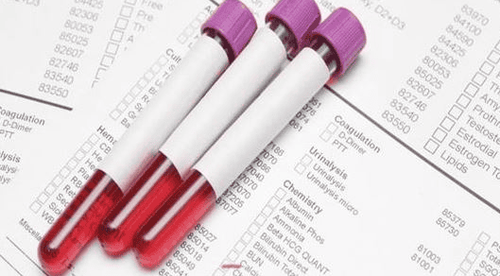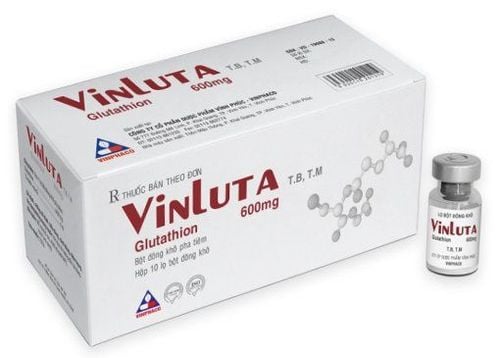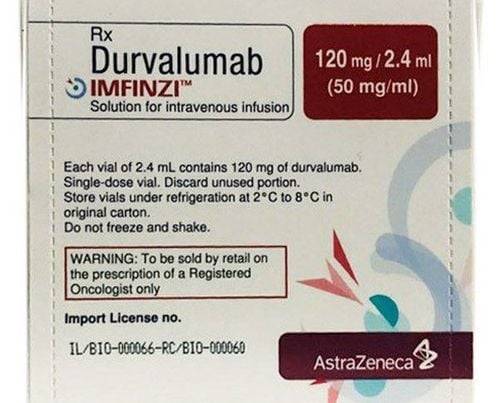This is an automatically translated article.
Written by doctors of Internal Oncology - Radiation Oncology Center, Vinmec Times City International Hospital.Tumor markers, also known as tumor markers, are substances produced by cancer cells or by non-cancerous cells. body letter. The presence of tumor markers in the body may be associated with cancer or some other benign (non-cancerous) condition
1. What is a tumor marker?
Most tumor markers are produced by normal cells as well as by cancer cells. However, they are produced at much higher levels under cancerous conditions. These substances can be found in the blood, urine, stool, tumor or other tissues or body fluids of some patients with cancer. Most tumor markers are proteins. Recently, however, cancer cell DNA and gene expression patterns have also begun to be used as tumor markers.Many different types of tumor markers, some associated with only one type of cancer, while others are associated with two or more cancers. There are no tumor markers that can detect any type of cancer.
The content of this article helps you to properly understand the value of some cancer markers (through blood and urine tests) as well as its limitations in early diagnosis of cancer

Chẩn đoán sớm bệnh ung thư qua xét nghiệm các dấu ấn khối u bằng xét nghiệm máu
2. Meaning of tumor markers
Tumor markers are used to help detect, diagnose, and monitor certain types of cancer. Although elevated levels of tumor markers may suggest the presence of cancer, this is not sufficient to diagnose cancer. As a result, testing for tumor markers is often combined with other tests, such as a biopsy, to diagnose cancer
For people who already have cancer, these markers can can contribute to treatment planning and monitoring as well as disease prognosis
Periodic follow-up during cancer treatment, if levels of tumor markers decrease or return to normal, may may indicate that the cancer is responding well to treatment, while levels that are unchanged or increased may indicate that the cancer is not responding. This will help the doctor change the plan, change the treatment drug for the patient.
Tumor markers can also be monitored after treatment ends to check for disease recurrence
3. What tumor markers are currently being used for?
Currently commonly used tumor markers are listed below.
Alpha-fetoprotein (AFP) Cancer types: Liver cancer and germ cell tumors Tissue analysis: Blood Usage: To help diagnose liver cancer and monitor response to treatment; to evaluate staging, prognosis and response to treatment of germ cell tumors Beta-2-microglobulin (B2M) Types of cancer: Multiple myeloma, acute lymphoblastic leukemia, malignant lymphoma Histology Analysis: Blood, urine or cerebrospinal fluid Usage: To determine prognosis and monitor response to Beta-hCG treatment
Cancer types: Carcinoma and germ cell tumors Tissue analysis: Urine or blood Usage: To assess staging, prognosis and response to treatment CA15-3 / CA27,29 Type Cancer: Breast Cancer Tissue Analysis: Blood Usage: To monitor during treatment is effective or disease has recurred CA19-9 Cancer types: Pancreatic cancer, gallbladder cancer, cancer bile duct and stomach cancer Tissue analysis: Blood Usage: To assess whether treatment is effective CA-125 Cancer type: Ovarian cancer Tissue analysis: Blood Usage: To help diagnose Diagnosis, treatment response assessment and recurrence monitoring Calcitonin Cancer type: Medullary thyroid cancer Tissue analysis: Blood Usage: To aid in diagnosis, check if treatment is effective. and monitoring for recurrence Carcinoembryonic antigen (CEA) Cancer types: Colorectal cancer and some other cancers Tissue analysis: Blood Usage: see if treatment is effective and monitor recurrence emit fibrin / fi brinogen Cancer type: Bladder cancer Tissue analysis: Urine Usage: To monitor progression and response to treatment Immunoglobulins Cancer types: Multiple myeloma and Waldenström macroglobulinemia Tissue analysis: Blood and Urine Usage: To help diagnose disease, assess response to treatment, and look for recurrence Lactate dehydrogenase Cancer types: Germ cell tumor, lymphoma, leukemia, melanoma and neuroblastoma Tissue Analysis: Blood Usage: For staging, prognosis and response to NSE treatment Cancer types: Small cell lung cancer and neuroblastoma Tissue analysis : Blood Usage: To help diagnose and assess response to treatment Prostate-specific antigen (PSA) Cancer type: Prostate cancer Tissue analysis: Blood Usage: To help diagnose , assessment of response to treatment and detection of recurrence Thyroglobulin Cancer type: Thyroid cancer Tissue analysis: Blood Usage: To assess response to treatment and recurrence detection
4. Can tumor markers be used in cancer screening?

Trao đổi với bác sĩ về dấn ấn khối u có được sử dụng sàng lọc bệnh ung thư hay không?
Since tumor markers can be used to assess the extent of a tumor with treatment and prognosis, the researchers hoped that they could also be useful in screening tests to detect cancer early, before there are any symptoms. For a screening test to be useful, that marker needs to have very high sensitivity (the ability to accurately identify people with the disease) and specificity (the ability to accurately identify people who don't have the disease). If the test is highly sensitive, it will identify most people who actually have the disease and produce very few false negatives. If the test is highly specific, only a small number of people will test positive but not actually get it, in other words, it will give very few false positives.
Although tumor markers are extremely useful in determining whether a tumor is responding to treatment or assessing whether the disease has recurred, no tumor markers have been identified to date. determined to be sufficiently sensitive and specific for use in cancer screening.
For example, the prostate-specific antigen (PSA) test, which is commonly used to screen men for prostate cancer. However, elevated PSA levels can be caused by benign prostate conditions as well as prostate cancer. Several clinical trials have also demonstrated this. Similarly, results from the trial showed that CA-125, a tumor marker, is sometimes elevated in the blood of women with ovarian cancer but can also be elevated in women with the benign condition, which is inadequate. Sensitivity and specificity for use with ultrasound to screen for ovarian cancer in women at average risk...
For example, carcinoembryonic antigen (CEA) is a tumor marker used used in colon cancer, but only 70-80% of patients with colon cancer have elevated CEA. This means that 20-30% of people with colon cancer will not have elevated CEA levels. Only 25% of early-stage colon cancers have elevated CEA. Because of this, CEA cannot always help find colon cancer in its early stages, when cure rates are best.
Currently all cancer markers can be performed at Vinmec Times City Hospital, but the appointment to bring its true value requires the consultation of a tumor specialist. tumor. Avoid the situation that only looking at tumor markers that ignore the diagnosis of cancer in the early stages, or sometimes the feeling of anxiety when the test shows that the cancer marker is higher than normal.
Please dial HOTLINE for more information or register for an appointment HERE. Download MyVinmec app to make appointments faster and to manage your bookings easily.













